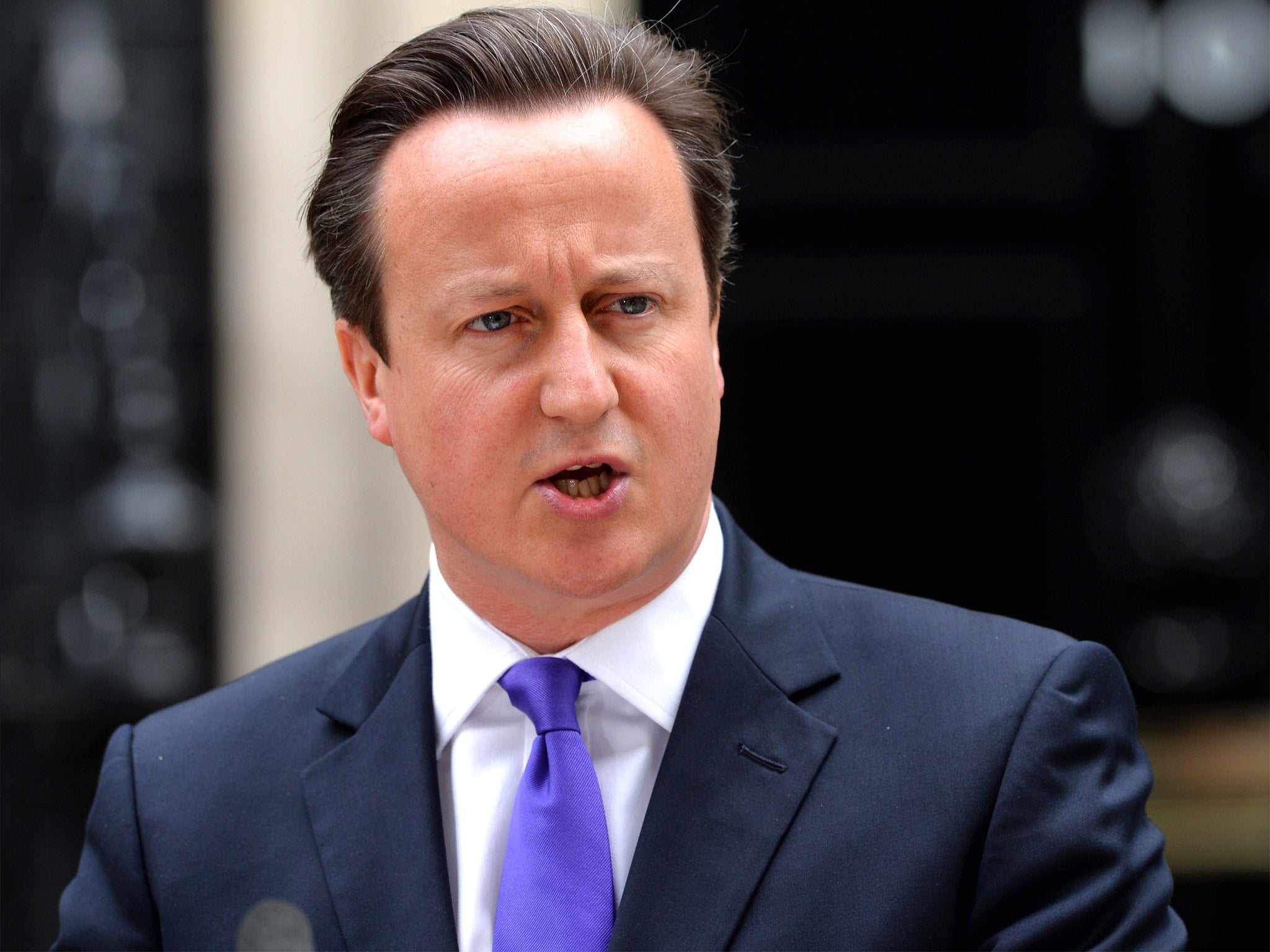Exclusive: Tories now more divided than under John Major, voters believe
Large majority think David Cameron lacks leadership skills to deliver victory at next election, survey for The Independent shows

Most Britons believe the Conservatives are more divided today than they were under John Major, according to a poll indicating that voters are deserting the party after a series of internal rows.
A large majority of voters think David Cameron lacks the leadership skills to deliver victory at the next election, the survey for The Independent shows.
The scathing verdict on the health of the Tory party revealed by the ComRes survey follows a bruising fortnight for the Prime Minister in which he was hit by backbench rebellions over Europe and same-sex marriage.
It also finds backing for the UK Independence Party has climbed to a record high, with nearly a fifth of Tory supporters at the last election saying they would switch their allegiance to Nigel Farage’s party.
Labour support has fallen to 34 per cent, a drop of four points since last month and its lowest share of the vote since Ed Miliband was elected leader. The Conservatives are on 30 per cent (down two), Ukip on 17 per cent (up four) and the Liberal Democrats trailing with 10 per cent (up one).
Most worryingly for Tory strategists, the notion that the party is at war with itself appears to be growing. Fifty-six per cent regard the Conservatives as more divided than during John Major’s turbulent leadership in the 1990s, with only 23 per cent disagreeing. Forty-nine per cent of Tory voters and 72 per cent of Ukip supporters see the party as more split than it was in the 1990s.
The recent turmoil also seems to have tarnished the voters’ view of the Prime Minister’s leadership ability, with 61 per cent doubting he possesses the qualities required to win the election outright in 2015, compared with 23 per cent who believe he has the necessary skills.
Nearly two-thirds of Tory supporters (63 per cent) still have confidence in his leadership. But the opposite view is held by an overwhelming 86 per cent of Ukip backers, many of whom are disillusioned former Conservative voters who Mr Cameron needs to tempt back.
The unfavourable comparison with the Major years will be wounding for the Conservative hierarchy as the party’s splits over Europe contributed to a crushing election defeat in 1997.
That experience prompted Mr Cameron in his first conference speech to warn his party of the electoral dangers of “banging on about Europe”.
More than six years later, the issue haunts the Prime Minister, with 114 of his MPs defying him two weeks ago to back a Commons motion deploring the absence of plans for a referendum on EU membership in the Queen’s Speech. It was followed by 130 Conservatives voting against Mr Cameron’s proposal to legalise gay marriage.
Ukip’s support in ComRes polls for The Independent has almost quadrupled in the past year and has risen since the local elections on 2 May.
Labour’s low ratings will alarm senior party figures who believe the party should be building a commanding lead over Mr Cameron, given the Tories’ woes. Its four-point drop in a month suggests it is also losing support to Ukip. Conversely the Conservatives will draw some comfort from the fact their support is not lower and the hope they can tempt many Ukip defectors back. The Liberal Democrats are four points lower than after their conference last autumn.
ComRes interviewed 1,000 GB adults by telephone between 24 and 26 May. Data were weighted to be demographically representative of all GB adults. Data were also weighted by past vote recall.
Major disaster: It all ended in jeers
John Major won more votes than any other British prime minister when he clinched a surprise general election victory in 1992 (although this did not translate into the highest number of seats). He enjoyed the briefest electoral honeymoon until the humiliation of Black Wednesday, when sterling crashed out of the Exchange Rate Mechanism four months later. From then on it was unrelenting misery as the fatal blow to his government’s reputation for economic competence coincided with Tory internecine warfare over Europe.
Hardline Eurosceptics queued up to berate Major for signing the Maastricht Treaty and establishing the single European market. They sought to scupper the agreement and in desperation he called a confidence vote causing immense damage to his standing. Removing the whip from eight Eurosceptic rebels simply wiped out the Tories’ slender parliamentary majority. In an unguarded moment Major protested about the manoeuvrings of three unnamed “bastards” in his cabinet.
European paroxysms also coincided with a succession of sex scandals which followed the announcement of a “back to basics” crusade. His attempts to impose his will on the party failed. The Tories crashed to a humiliating election defeat in 1997.
Nigel Morris
Join our commenting forum
Join thought-provoking conversations, follow other Independent readers and see their replies
Comments